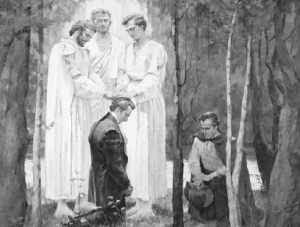 Back in my Mormon Matters days (a John Dehlin website), it seems like we’d get a post every couple of weeks about how the scriptures are full of bad stories of God commanding the death of someone. We’d get complaints about Nephi and Laban, of course, but the story that seemed to get the most attention was that of Abraham being commanded to sacrifice Isaac.
Back in my Mormon Matters days (a John Dehlin website), it seems like we’d get a post every couple of weeks about how the scriptures are full of bad stories of God commanding the death of someone. We’d get complaints about Nephi and Laban, of course, but the story that seemed to get the most attention was that of Abraham being commanded to sacrifice Isaac.
I remember one post, in particular that suggested the story should be changed to have Abraham refuse to sacrifice Isaac and the angel of God then praises Abraham for refusing to do something immoral even if God commands it.
I can see why this story is so troubling to theological liberals and non-believers. This story simply leaves no room to ethically explain it away. Continue reading

